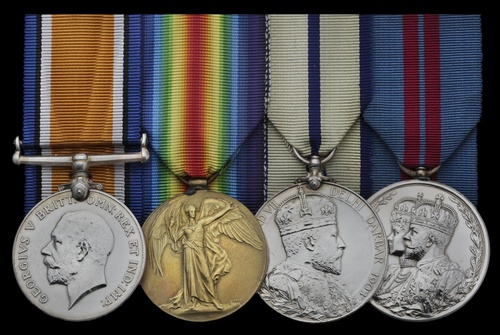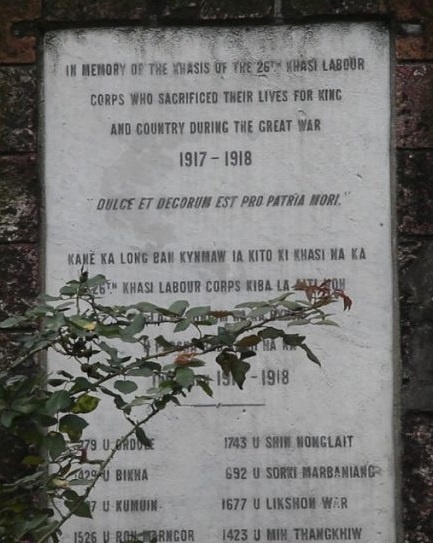Auction: 22002 - Orders, Decorations and Medals
Lot: 91
The campaign group of four awarded to Lieutenant-Colonel B. C. Allen, C.S.I., Indian Civil Service, who commanded the 55th Company, Khasi Labour Corps during the Great War
British War and Victory Medals (Lt. Col. B. C. Allen.); Delhi Durbar 1903; Delhi Durbar 1911, good very fine (4)
[C.S.I.] London Gazette 3 June 1922:
'Commissioner, Assam Valley Division.'
Basil Copleston Allen was born at Stoke Newington on 12 July 1870. Entering the Indian Civil Service, he earned his Durbar 1903 as Personal Assistant to the Chief Commissioner of Assam. Upon the outbreak of the Great War, he was soon involved in the raising and command of the Labour Corps in Khasi in the North-East of India. A fascinating article by Pratap Chhetri features at http://hiddenhistorieswwi.ac.uk/tag/memorials/ and recalls:
'...Men from present day North East India were a part of the 21,000 strong Indian Labour Corps who were recruited by the British from the non-martial races and tribals of present day Eastern and North Eastern India in early 1917 to serve as labourers and porters in the theatres of the action in France on the Western Front. These Labour Corps were christened from the regions that they came from – Garo Labour Corps, Khasi Labour Corps, Lushai Labour Corps, Manipuri Labour Corps, Naga Labour Corps and even the Chin Labour Corps from today’s Chin state of Myanmar, which was then still a part of British India. Each of the Labour Corps had a number of units. Each corps unit was roughly made of 500 men commanded by British officers and even sometimes by men who had worked in the region in various capacities but with little military experience. In some cases these officers were assisted by British missionaries who were spreading the Gospel in various corners of the then excluded areas of the north eastern part of India...
The Khasi Labour Corps initially seems to have been known as the 26th Khasi Labour Corps which was later divided into four companies – 22nd, 34th, 55th and 56th with perhaps 500 men in each company. There seems to be no exact estimate of the number of men in this corps, or even if the numbers exist, it has not been reported in available literature on the subject. Herbert Cunningham Clougston and F. B. Wilkins were the European officers of the Corps while David Stephen Davies, a Presbyterian missionary and Rev. Shai Rabooh, a Khasi preacher also accompanied the Corps to France. 67 men died and to commemorate their sacrifices a memorial ‘Mot Phran’ (which in Khasi means 'Stone from France') with the names of those who died inscribed on it was installed and inaugurated by the D.C. of Khasi-Jaintia Hills in 1924 at Iewduh in the heart of Shillong. Carved on the memorial is a quotation from the Roman lyrical poet Horace’s poem Odes: Dulce et decorum est pro patria mori. (It is sweet and right to die for your country). The memorial still stands intact, though neglected over the years.
In 1915, the British Government ordered the expulsion of the German Catholic missionaries of the Congregation of the Divine Saviour (Salvatorians) who had set foot in the Khasi Hills in 1890. It was this congregation that laid the early foundations of the Catholic Church in the region and perhaps the North East too. The first Catholic Church in the North East was built by this Congregation in 1913 on the same site where the Cathedral of Mary Help of Christians stands today.'
Allen took the 55th Company to France (IOR/L/MIL/7/17120 refers) and thence transferred to England in October 1918. Having been awarded a C.S.I. and retiring to England, he died at Marylebone on 22 September 1935.
Subject to 20% VAT on Buyer’s Premium. For more information please view Terms and Conditions for Buyers.
Sold for
£850
Starting price
£480







